Social Watch news
Published on Fri, 2011-10-21 12:50
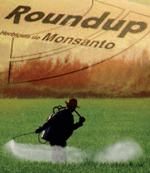
Photo; Navdanya International
|
Far from putting an end to the hunger in the world and from improving farmer’s quality of life, genetically modified organisms (GMOs) are raising food insecurity and health hazards and failing to increase the yields of crops, according to new scientific studies. And now Chinese authorities prepare to ban the commercialization of transgenic rice and wheat for the next five to ten years, as reported the Third World Network (TWN).
|
Published on Thu, 2011-10-20 11:59

Clashes in Maspero
(Photo: Youm7)
|
Twenty-one human rights organizations (among them the Egyptian Association for Community Participation Enhancement, focal point of Social Watch in that country) accused this week the interim government in Cairo and the Supreme Council of the Armed Forces of inciting the sectarian violence that caused almost 30 deaths this month in Maspero.
|
Published on Wed, 2011-10-19 09:22
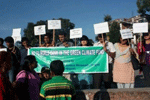
Photo: WB Out of Climate Finance
|
The Nepalese Campaign for Climate Justice Network (CCJN) and other groups organized a demonstration on Oct. 12 near the office of the World Bank in Kathmandu against the role of that international financial institution in the Green Climate Fund.
|
Published on Mon, 2011-10-17 12:03

Mounted NYPD at Occupy Wall
Street
(Photo: Thimoty Krause/Flicrk)
|
Tens of thousands people took the streets of New York, Vancouver, Madrid, Rome and dozens of other cities in North America, Europe and other regions this weekend, to protest against corporate greed and the steps taken by the governments to put an end to the economic and financial crisis. This movement “is taking off all over the world,” said Armine Yainizyan, expert with the Canadian Center for Policy Alternatives, one of the focal points of Social Watch in that country.
|
Published on Thu, 2011-10-13 17:24
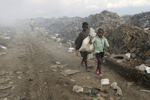
Haitian children look for valuables
in a garbage dump in Port-au-Prince.
(Photo: Logan Abassi/UN)
|
The first decade of the 21st century was a lost decade in the fight against poverty, in spite of the excellent performance of the emerging economies, said Roberto Bissio, coordinator of Social Watch, on the eve of the international days on hunger and poverty.
Social Watch, a network of citizen organizations monitoring social policies around the world, launched today a Basic Capabilities Index (BCI) derived from well-being indicators which shows very slow progress in the last twenty years. This index contradicts the assessment of the World Bank, according to which extreme poverty would have halved around the world between 1980 and 2005.
|
Published on Thu, 2011-10-13 17:08

Protest in Wall St. last week.
(Photo: Matt McDermott/Flickr)
|
Far from improving the quality of life of the world population, increased trade and per capita income have not resulted in reduced poverty, according to the most recent Basic Capabilities Index (BCI) published by Social Watch, an international network of civil society organizations.
|
Published on Thu, 2011-10-13 17:00

Photo: BabyDinosaur/Flickr
|
What do Costa Rica, Uruguay and Georgia (the country in the Caucasus, not the American state) have in common? They all have achieved high positions in their social indicators while keeping their emissions of climate changing carbon dioxide at less than half of the global per capita average.
|
Published on Thu, 2011-10-13 16:50
“The hard numbers have proved that prosperity does not trickle down,” said Roberto Bissio, coordinator of Social Watch, at the launch of the Basic Capabilities Index computed by this non-governmental watchdog organization. “It used to be common sense that a growing economy benefits the poor, that a rising tide will lift all boats, big or small, or that the pie has to grow first before we can share it,” he added, but the figures published by Social Watch on the eve of the international days on hunger and poverty seem to show the opposite.
|
Published on Tue, 2011-10-11 07:54
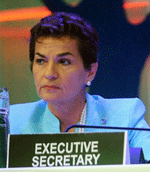
Cristina Figueres. (Photo: IISD)
|
The Third World Network (TWN, point focal of Social Watch), “do not support any outcome” of the negotiations on climate change “that undermines or terminates the Kyoto Protocol, or that enshrines a weaker system than the Kyoto Protocol in international law,” according to the statement the group published on the occasion of the Ad Hoc Working Group on Long-term Cooperative Action under the Convention on Climate Change (AWG-LCA), held last week in Panama City.
|
Published on Fri, 2011-10-07 08:24
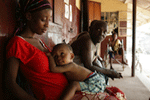
Government hospital in Makeni,
Sierra Leone.
(Photo: Nancy Palus/IRIN)
|
The brain drain, the lack of appropriate facilities, equipment and drugs and the inequity in the access to the services between urban and rural populations hinder Africa from reaching the health-related MDGs, warned the Third World Network-Africa (TWN-A, organization based in Accra that integrates Social Watch). Governments should focus “as a matter of urgency” on the maternal and child healthcare services as first steps.
|

|













